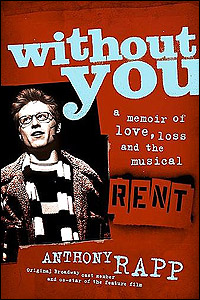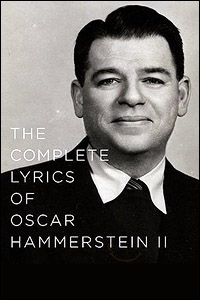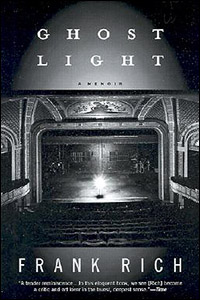From a Stephen Sondheim bio to the letters of Noël Coward, from Frank Rich's love affair with the theatre to Anthony Rapp's life-changing Rent experience, Ted Chapin's fascinating account of the making of Follies and the art of Oscar Hammerstein II — all of these staff picks are still in print and any one of them would make the perfect companion, as you while away the dog days of summer at the beach, poolside, on your terrace or even in the air-cooled comfort of your living room. (Original publication dates shown.)
*
JOLIE SCHAFFZIN, Playbill magazine's director of fashion and beauty advertising, chooses:
Stephen Sondheim: A Life by Meryl Secrest (1999)
Meryl Secrest's work was the first full-scale biography of the composer–lyricist of such landmark musicals as Company and Sunday in the Park With George. Sondheim grew up on New York City's Upper West Side. His father, a dress manufacturer and amateur musician, taught him to play piano, but his childhood was severely shaken when he was ten years old and his parents divorced. The biography delves into the young boy's feelings of loneliness and abandonment and the safe haven he found with Dorothy and Oscar Hammerstein II. Hammerstein became his idol, prompting the budding composer to follow in the great lyricist–librettist's footsteps. Before the advent of Sondheim's greatest theatrical successes, he tried his hand at screenwriting (on the Roman set of John Huston's "Beat the Devil," starring Humphrey Bogart and for television's "Topper" series). A chance meeting with playwright Arthur Laurents led to his collaboration (as lyricist) on the Leonard Bernstein–Laurents–Jerome Robbins production of West Side Story and then to his work with Jule Styne and Laurents on Gypsy. Secrest covers the astonishing string of creative successes Sondheim achieved in the almost 20-year association with producer–director Harold Prince that produced such artistically daring and compelling shows as Follies, Sweeney Todd, Pacific Overtures and A Little Night Music. The biography draws on Secrest's extended conversations with Sondheim as well as her interviews with his friends and colleagues. And throughout, she paints a vivid picture of the passion, energy and talent that went into the making of Sondheim's theatre, including a cast that reads like a who's who of the American musical: Hammerstein, Bernstein, Robbins, Ethel Merman, Richard Rodgers, Zero Mostel, Bernadette Peters and more. ANDREW GANS, senior editor of Playbill.com, chooses:
Without You: A memoir of love, loss, and the musical Rent by Anthony Rapp (2006)
In his inspiring memoir, original Rent cast member Anthony Rapp writes about of the life-altering experience of co-starring in Jonathan Larson's acclaimed musical and of his personal struggles to, according to notes on the book's jacket, "balance the demands of life in the theatre with his responsibility to his family." When he landed the role of Rent's Mark Cohen, Rapp's life was on the upswing. Not only was he exhilarated to be present at the birth of this contemporary musical phenomenon but also he was rejoicing in the news that his mother's cancer had gone into remission. By the time Rent had opened on Broadway, that feeling of elation was played out against great tragedy. The day before the musical was to open Off-Broadway, the theatre community was shocked by news of the sudden death (from a heart ailment linked to Marfan Syndrome) of its creator Jonathan Larson. The musical, based on Puccini's La Bohème, made a triumphant transfer to Broadway, opening at the Nederlander Theatre on April 29, 1996, and Larson received a posthumous Pulitzer Prize for Drama. In an unhappy confluence of events, around this time, Rapp's mother began to lose her battle with cancer, and he writes with great emotional power of his struggle to reconcile his professional success with his overwhelming personal losses. Rapp also writes openly and honestly about how his discovery of his sexuality put a strain on his relationship with his mother and how he worked into his adult life to gain her acceptance. KENNETH JONES, managing editor of Playbill.com, chooses:
The Complete Lyrics of Oscar Hammerstein II by Oscar Hammerstein II; edited by Amy Asch (2008)
Anyone who has ever looked out on a glorious sunrise and sung to no one in particular, "There's a bright, golden haze on the meadow . . . " or read a newspaper report of some mind-numbing injustice and hummed the line, "you've got to be taught to hate and fear . . . " will recognize the extent to which the words of Oscar Hammerstein II have infiltrated our collective consciousness. Of course, the great lyricist didn't write the melodies that are likely spinning around in your head at the moment. That distinction belonged to Hammerstein's longtime writing partner, composer Richard Rodgers. But the lyricism of Hammerstein's deceptively simple words translates into the sound of music. One might even describe them, as did another legendary tunesmith named Irving Berlin, as poetry. These and another 848 of Hammerstein's lyrics — from his earliest to his last, "Edelweiss" — have been researched, compiled and lovingly presented in this hefty, attractive volume, the sixth in the "Complete Lyrics" series that has covered the work of such other great lyricists as Berlin, Cole Porter and Ira Gershwin. In his long career, Hammerstein wrote lyrics and libretti for such classic operettas as Rose Marie (music by Rudolf Friml) and The Desert Song (music by Sigmund Romberg). He wrote eight musicals with Jerome Kern, including their masterwork, Show Boat. In 1943 he teamed with Richard Rodgers on Oklahoma!, the watershed show that ushered in a new era in American musical theatre and launched one of its most successful partnerships. Together they wrote such other classics of the genre as Carousel, South Pacific and The King and I. The through line in these and all of Hammerstein's work was an informed yet unassailable optimism. His outlook is distilled on the book jacket of this remarkable compilation: "I know the world is filled with troubles and many injustices," he once said. "But reality is as beautiful as it is ugly . . . I just couldn't write anything without hope in it." ANDREW KU, director of Playbill.com, chooses:
Ghost Light by Frank Rich (2001)
Frank Rich's eloquent boyhood memoir takes its title from an essential piece of backstage equipment: the ghost light. According to theatrical superstition, a theatre left in complete darkness is an invitation for a ghost to take up residence. So to keep ghouls at bay, a single light is left onstage after actors, audiences, musicians and technicians have departed. When Rich was a young boy growing up Washington, DC, in the late 1950s/early 1960s, the theatre became his ghost light, bathing him in security and protecting him from the minefields of an often tumultuous childhood. Rich vividly recalls the joy he felt listening to original LP recordings of shows like South Pacific, Damn Yankees and The Pajama Game. His parents — avid theatregoers — would bring them home after having seen the shows, and they became the soundtrack for the young boy's formative years. Those were the good days. When his parents divorced, his life changed. The family, which included his younger sister, moved to different neighborhoods, and as Rich went from school to school, his feelings of loneliness and insecurity increased (he became afraid of the dark), while his "broken home" status set him apart from other kids. What also set him apart was a stepfather whose behavior alternated confusingly between largesse and abuse, both physical and emotional. The one constant, the thing that made Rich happiest and helped him transcend his turbulent childhood was anything that had anything to do with Broadway. His stepfather bought show tickets for him (an example of the largesse). Rich gobbled up any information he could from the pages of The New York Times (where the stage-struck kid ultimately became chief theatre critic from 1980–1993) and Variety. He scoured the ads on the theatre pages and clipped them. He collected Playbills — those from the shows he attended and the discarded ones he'd pick up while roaming around his playground, otherwise known as the Broadway theatre district. As a teenager, Rich was a ticket-taker at the National Theatre in DC. This got him entrée into a world he'd only imagined as a kid, as he met and was mentored by charismatic characters like the theatre's manager Scott Kirkpatrick and, later, Clayton Coots, a company manager. This is a rich tale, richly told (pun intended). Continued...














